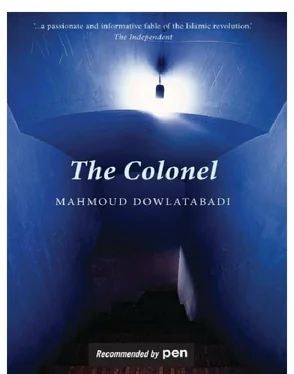“Supper’s ready, bro!”
At the sound of Mohammad-Taqi’s voice, Khezr blinked and sat up on the edge of the bed. Before his brother could come down, Amir shot up and grabbed the tray from him and was about to turn round and come down with it when Mohammad-Taqi said, rather louder than he should have:
“Father wants to see you, bro!”
Amir went weak at the knees, but, toughing it out and giving no sign of his alarm, he went back down into the cellar, set the tray down on the rush mat and made a place for Khezr to sit down next to it, while watching for Khezr’s reaction to what Mohammad-Taqi had said. Khezr gave no sign that he had heard anything and began to chew quietly on his food. Amir now seemed to have lost interest in inquiring about Nur-Aqdas. He was more interested in where Khezr was going to sleep after his supper, and why Mohammad-Taqi had used their father as an excuse to get him away from Khezr. How was he going to find an excuse for leaving his guest alone?
“Is there any hooch around the place?”
There was. He put the plastic petrol can of arack down in front of Khezr, with a glass and a bowl of olives. When he got stuck in, Amir had an excuse to leave the room. He put on his slippers and went upstairs to the sitting-room, where his father was waiting for him. He was sitting on a chair next to the stove, beneath the portrait of The Colonel, reading the Shahnameh , the story of Manuchehr, most likely. 36
Mohammad-Taqi was sitting on the bentwood chair, oiling his pistol in the light of the lamp hanging from the ceiling. When he caught sight of Amir, he looked up from his task for a moment. Amir waited patiently to find out what the colonel wanted, but the old man’s head was buried in the Shahnameh and showed not the slightest interest in his son, even though he had heard Mohammad-Taqi calling him up from the basement. Amir was worried that he should not have left Khezr alone. The long silence forced on him by his father and brother made him feel small. Finally, he broke it himself.
“Father, what was it you wanted to see me about?”
the colonel peered at Amir over the top of his glasses, shook his head in irritation and buried himself once more in the Shahnameh , handing Amir over to his brother. Mohammad-Taqi did not give Amir a chance to speak. As he finished reassembling his weapon he adopted an abrupt tone that Amir had never heard him use before:
“Who is he, bro?”
Amir did not answer. He decided to stand on his dignity as the elder brother and shut Mohammad-Taqi up. Without a word, he turned round and headed for the door. But, before he reached the verandah, he was brought up short by a bark from Mohammad-Taqi. He stopped, then turned to face his brother, who was casually examining the weapon in his hand.
“What does it matter to you who he is?”
Mohammad-Taqi looked him straight in the face: “I know what sort of person he is.”
“What sort of person is he, then?”
“Police.”
“How do you know?”
“I’ve seen him, I recognise him.”
“Where from?”
“Around the prison, before they stopped visits from brothers and sisters.”
Mohammad-Taqi did not need to add that he had actually seen Khezr Javid face to face, on one of his visits to Amir. Amir was shocked into silence and his knees began to shake. It seemed that they now took him for an accomplice of Khezr. Struck dumb by this realisation, he stood awkwardly in front of his brother. His tongue felt as dry as a brick and he could not swallow his saliva. the colonel had looked up from his Shahnameh and was peering at him in astonishment over his spectacles. There was nothing for it; he had to come clean, before things got out of hand. And so, steadying himself on the table with his hands, he leaned over to Mohammad-Taqi and said:
“He’s a guest. He’s staying with us tonight. He didn’t treat me so badly when he was interrogating me. Anyway, I want to get something out of him about the disappearance of my wife. So don’t go kicking up a fuss about this — understood? I’m being completely above board with you.”
the colonel had sunk back into his book. Amir had not noticed that, while he had been talking to Mohammad-Taqi, his father had lit a cigarette. He saw that he had put his half-empty tea glass down in front of him. Amir turned round and looked at his brother once more. Mohammad-Taqi avoided his glance, got up and went over to the far end of the room, where there was an old wooden bed. Amir watched him go in silence. Not wanting to dilute the force of his words by saying anything else, he slipped out of the room, went out onto the verandah and crept down the stairs to the basement, making an effort not to let on to Khezr that anything to do with him had been going on upstairs.
But Khezr was no fool; Amir knew from experience that he was always suspicious of his own shadow. As he lifted his glass to his lips he looked at Amir and, for as long as it took him to drink half of it down, he kept his eyes firmly fixed on Amir, piercing his very soul, so that he felt all the hairs on his body stand up on end like kebab skewers. He felt dried out. He could not move. It felt like being back in the interrogation room. His heart was thumping. He looked around for the card on the wall with the verse from the Qur’an that read, ‘Salvation comes to the honest.’ He stood waiting, like a scarecrow, for Khezr to give him permission to sit down.
“Sit down!”
Amir sat down. I sat down. I did just as I was told. Sitting down is a perfectly normal thing for a human being to do; if one hears of someone that he has sat down, one can have only one thing in mind. But in that instant it struck Amir that there were as many ways of sitting down as there were people in the world, in all their diversity. On the face of it, Amir sat down politely, but he was aware that, beneath the surface, his mind was seething with that sense of subjugation and fear which occasionally shows itself as ‘good manners,’ and that there is not a clear line between the two… It suddenly seemed vitally important to him to prove his utter obedience to Khezr Javid. His bearing, his expression and everything about him had to signal to Khezr that he was prepared to meet his every wish and do whatever he wanted. Meanwhile, as if to underline Amir’s utter humiliation, Khezr Javid was not even deigning to look at him, but was glaring round every corner of the room instead. Amir hoped that Khezr would accept with magnanimity his signs of humility and surrender. Observe my subservience, Your Excellency Dr Javid!

Nobody had told Amir how to behave under interrogation. He assumed from the layout of the place and his general position that he was required to keep looking straight ahead, even though right next to him the screams of Nur-Aqdas Khamami were rending the air, as she was being savagely beaten by one of Khezr’s lieutenants. A braver soul than him might have dared to lift his eyes up a little, as far as the portrait on the wall of the Shah with his medal-bedecked chest, but even that would have been to break the unwritten rules of the interrogation room. Rules which, like minute airborne particles, from the first moment of your arrest, work their way out of the air into your very soul. When they made you change out of your clothes in the guardhouse and put on a pair of scruffy grey overalls, which made you look like a scarecrow, you felt those unwritten rules becoming engraved on your heart.
“Hand him the form!”
It was the charge sheet.
“Sign here.”
Both the basic principles of human rights and the written law require that a suspect must be informed of the nature of the charges against him within twenty-four hours of his arrest. Within that time he must be formally charged and he has to sign the charge sheet. If sufficient evidence is not produced within twenty-four hours, the prosecution is not entitled to pursue the case against the accused. Amir only found this all out later. He had never felt the need to think about the whys and wherefores of having such a clearly spelt out law. What earthly reason would any Iranian have to trouble himself about the law or try to keep to it? Here, the law had always been delivered at the blunt end of a cosh, hadn’t it? All Amir wanted to find out, law or no law, was why he had been arrested, for he still had no idea. Desperate to know what I was accused of, I had high hopes of Khezr Javid , who was now standing by his desk.
Читать дальше













